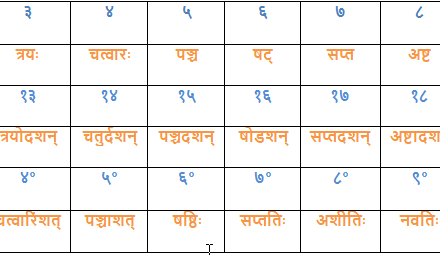The above noun endings which you see are very rare. They are not used so commonly as the previous endings we have seen. It is because they are not so reliable in terms of forming compounds. But it becomes equally important for us to be aware of all the common and uncommon noun endings. So let us begin
ai
The noun for this noun ending is rai, which means “wealth”. let us take a look at the following cases for this noun ending
-ai (masculine)
| रै | Singular | Dual | Plural |
|---|---|---|---|
| Case 1 (Subject) | राः rāḥ | रायौ rāyau | रायः rāyaḥ |
| Case 2 (object) | रायम् rāyam | रायौ rāyau | रायः rāyaḥ |
| Case 3 ("with") | राया rāyā | राभ्याम् rābhyām | राभिः rābhiḥ |
| Case 4 ("for") | राये rāye | राभ्याम् rābhyām | राभ्यः rābhyaḥ |
| Case 5 ("from") | रायः rāya | राभ्याम् rābhyām | राभ्यः rābhyaḥ |
| Case 6 ("of") | रायः rāyaḥ | रायोः rāyoḥ | रायाम् rāyām |
| Case 7 ("in") | रायि rāyi | रायोः rāyoḥ | रासु rāsu |
| Case 8 (address) | राः rāḥ | रायौ rāyau | रायः rāyaḥ |
o
the noun for this word is go, which means “bull” in the masculine gender, and “cow” in the feminine gender. The other word is dyo,( a feminine word) which means “sky”.
-0 (masculine, feminine)
| गो | Singular | Dual | Plural |
|---|---|---|---|
| Case 1 (Subject) | गौः gauḥ | गावौ gāvau | गावः gāvaḥ |
| Case 2 (object) | गाम् gām | गावौ gāvau | गाः gāḥ |
| Case 3 ("with") | गवा gavā | गोभ्याम् gobhyām | गोभिः gobhiḥ |
| Case 4 ("for") | गवे gave | गोभ्याम् gobhyām | गोभ्यः gobhyaḥ |
| Case 5 ("from") | गोः goḥ | गोभ्याम् gobhyām | गोभ्यः gobhyaḥ |
| Case 6 ("of") | गोः goḥ | गवोः gavoḥ | गवाम् gavām |
| Case 7 ("in") | गवि gavi | गवोः gavoḥ | गोषु goṣu |
| Case 8 (address) | गौः gauḥ | गावौ gāvau | गावः gāvaḥ |
au
Our last vowel is au and the only word that ends in this noun is nau, which means “ship”
-au (feminine)
| नौ | Singular | Dual | Plural |
|---|---|---|---|
| Case 1 (Subject) | नौः nauḥ | नावौ nāvau | नावः nāvaḥ |
| Case 2 (object) | नावम् nāvam | नावौ nāvau | नावः nāvaḥ |
| Case 3 ("with") | नावा nāvā | नौभ्याम् naubhyām | नौभिः naubhiḥ |
| Case 4 ("for") | नावे nāve | नौभ्याम् naubhyām | नौभ्यः naubhyaḥ |
| Case 5 ("from") | नावः nāvaḥ | नौभ्याम् naubhyām | नौभ्यः naubhyaḥ |
| Case 6 ("of") | नावः nāvaḥ | नावोः nāvoḥ | नावाम् nāvām |
| Case 7 ("in") | नावि nāvi | नावोः nāvoḥ | नौषु nauṣu |
| Case 8 (address) | नौः nauḥ | नावौ nāvau | नावः nāvaḥ |





